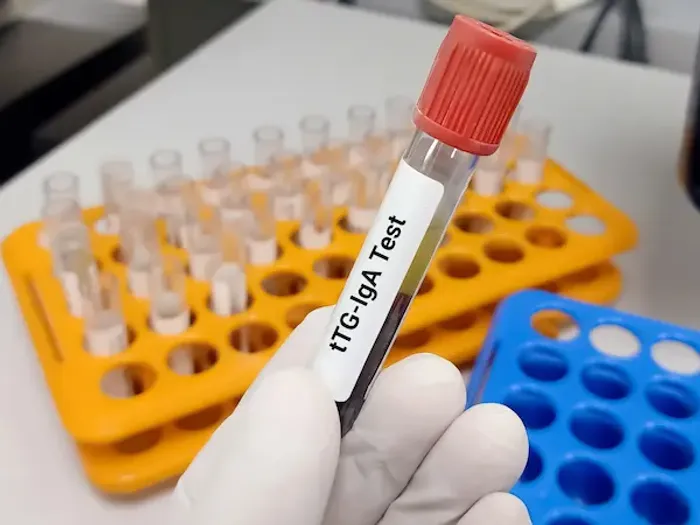TTG IgA Test Overview and Interpretation
The TTG IgA test is a key blood test for diagnosing celiac disease. Understand what this test measures, the meaning of your results (normal, borderline, or positive), and why it's crucial to be on a gluten-containing diet before testing.

Written by
Last updated on 29th Aug, 2025

If you or someone you know has been advised to take a TTG IgA test, you might have questions about what it is, why it’s needed, and what the results mean. This guide will help you understand the test in simple terms, including its purpose, how it works, and what steps to take next.
What is the TTG IgA Test?
The TTG IgA (Tissue Transglutaminase Immunoglobulin A) test is a blood test used to help diagnose celiac disease, an autoimmune disorder where the body reacts negatively to gluten (a protein found in wheat, barley, and rye).
When a person with celiac disease eats gluten, their immune system mistakenly attacks the small intestine, damaging its lining and preventing proper nutrient absorption. The TTG IgA test detects antibodies (proteins made by the immune system) that indicate this reaction.
Why is the TTG IgA Test Done?
Doctors recommend this test if you have symptoms that suggest celiac disease, such as:
- Digestive issues – Diarrhea, constipation, bloating, gas, or stomach pain
- Weight loss – Unexplained weight loss despite eating enough
- Fatigue & weakness – Due to poor nutrient absorption
- Skin rashes – Itchy, blistering rash (dermatitis herpetiformis)
- Anemia – Low iron levels despite a good diet
- Joint pain or headaches – Common in undiagnosed celiac disease
It may also be recommended if you have a family history of celiac disease or other autoimmune conditions like Type 1 diabetes or thyroid disorders.
How is the Test Performed?
The test is simple and involves:
1. A small blood sample taken from your arm.
2. The sample is sent to a lab to check for TTG IgA antibodies.
3. Results are usually available within a few days.
Preparing for the Test
- Do NOT stop eating gluten before the test – If you avoid gluten, the test may give a false negative result.
- No fasting is usually required.
- Inform your doctor about any medications you take.
Consult an General Physician for personalized consultation
Understanding Your Test Results
The results will show whether TTG IgA antibodies are present and at what level:
- Normal (Negative) Result – No or very low antibodies detected. Celiac disease is unlikely, but further testing may be needed if symptoms persist.
- Abnormal (Positive) Result – High levels of TTG IgA suggest celiac disease. A biopsy of the small intestine is usually the next step to confirm the diagnosis.
What If the Test is Positive?
If your test is positive, your doctor may recommend:
- Endoscopy with biopsy – A small tissue sample from the intestine is examined for damage.
- Genetic testing – To check for genes linked to celiac disease (HLADQ2 or HLADQ8).
- Followup tests – Such as other antibody tests (EMA IgA or DGP tests).
Managing Celiac Disease
If diagnosed with celiac disease, the only treatment is a strict gluten-free diet. This means avoiding:
- Wheat (bread, pasta, cereals)
- Barley (malt, beer)
- Rye (certain breads, crackers)
Tips for a GlutenFree Lifestyle
- Read food labels carefully – Look for hidden gluten in sauces, soups, and processed foods.
- Choose naturally gluten-free foods – Fruits, vegetables, rice, quinoa, corn, and lean meats.
- Avoid cross-contamination – Use separate utensils and cookware for gluten-free meals.
- Consult a dietitian – Helps plan balanced meals to prevent nutrient deficiencies.
When to See a Doctor?
If you experience ongoing digestive issues or other symptoms of celiac disease, consult a doctor. Early diagnosis can prevent complications like:
- Malnutrition (due to poor nutrient absorption)
- Osteoporosis (weak bones from calcium deficiency)
- Infertility or miscarriages (in some cases)
- Increased risk of other autoimmune disorders
Need Help? Book a Consultation or Test
If you suspect celiac disease or need a TTG IgA test, you can easily schedule a consultation or lab test through Apollo 24|7. Early testing ensures timely diagnosis and better health management.
Final Thoughts
The TTG IgA test is a crucial tool in diagnosing celiac disease. If you have symptoms, don’t ignore them—getting tested can help you take control of your health. Remember, a glutenfree diet can significantly improve your quality of life if celiac disease is confirmed.
Stay informed, stay healthy!
Consult an General Physician for personalized consultation
Consult an General Physician for personalized consultation

Dr. Syed Ismail Ali
General Practitioner
7 Years • MBBS
Hyderabad
Apollo 24|7 Clinic, Hyderabad

Dr. M L Ezhilarasan
General Practitioner
6 Years • MBBS
Visakhapatnam
Apollo 24|7 Clinic - Andhra Pradesh, Visakhapatnam

Dr D M Karthik
General Practitioner
4 Years • MBBS, Fellowship in Diabetes Mellitus, Advance certificate in Diabetes Mellitus, Derma Nutrition Certification
Visakhapatnam
Apollo 24|7 Clinic - Andhra Pradesh, Visakhapatnam

Dr. Mohammed Kamran
General Practitioner
5 Years • MBBS, FIDM
Nashik
Apollo 24|7 Clinic - Maharashtra, Nashik

Dr. Chaithra H
General Physician/ Internal Medicine Specialist
6 Years • MBBS, MD General Medicine, DNB General Medicine
Bangalore
Apollo 24|7 Clinic - Karnataka, Bangalore
Consult an General Physician for personalized consultation

Dr. Syed Ismail Ali
General Practitioner
7 Years • MBBS
Hyderabad
Apollo 24|7 Clinic, Hyderabad

Dr. M L Ezhilarasan
General Practitioner
6 Years • MBBS
Visakhapatnam
Apollo 24|7 Clinic - Andhra Pradesh, Visakhapatnam

Dr D M Karthik
General Practitioner
4 Years • MBBS, Fellowship in Diabetes Mellitus, Advance certificate in Diabetes Mellitus, Derma Nutrition Certification
Visakhapatnam
Apollo 24|7 Clinic - Andhra Pradesh, Visakhapatnam

Dr. Mohammed Kamran
General Practitioner
5 Years • MBBS, FIDM
Nashik
Apollo 24|7 Clinic - Maharashtra, Nashik

Dr. Chaithra H
General Physician/ Internal Medicine Specialist
6 Years • MBBS, MD General Medicine, DNB General Medicine
Bangalore
Apollo 24|7 Clinic - Karnataka, Bangalore